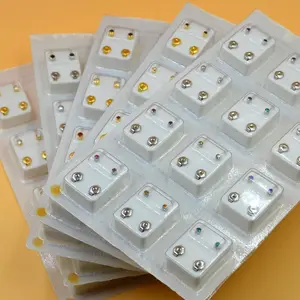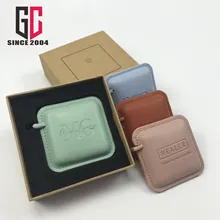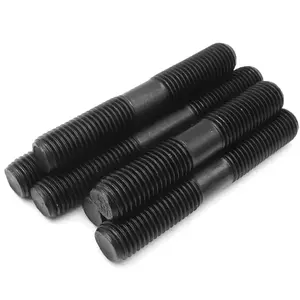What are Studs
Studs are a type of fastener used extensively in construction, mechanical, and industrial applications. They are essentially metal rods or shafts that usually have threading on both ends, designed to be permanently fixed on one side with the other side receiving a nut. These components find their uses in situations where it is necessary to mount objects onto a fixed structure or to join two parts together in a secure manner.
The principle behind their operation is straightforward: one end of the stud is anchored into a surface or substrate, while the other protrudes to accommodate the attachment of different components with a nut. This makes them particularly useful for applications where the use of a bolt may not be feasible due to space constraints or where the strength of a welded joint is desired without actual welding.
Studs come in an array of materials such as stainless steel, carbon steel, and alloy steel, each offering different properties to suit the environment they will be used in—be it high temperature, corrosive conditions, or areas requiring extra strength. They are pivotal in industries such as automotive, where engine parts are mounted securely using studs, or in construction, where they reinforce concrete or affix heavy load-bearing beams.
Types of Studs
Studs come in various types tailored to specific applications and requirements. Each type has its unique features and common use cases:
Fully Threaded Studs: These studs have threads along their entire length and are often used when precise alignment is needed. They're capable of handling higher stress and are commonly found in flange bolting or situations where thorough adjustment is necessary before final tightening.
Tap End Studs: Featuring a short thread on one end and a long thread on the other, tap end studs are designed for usage in applications where one of the joining materials has been tapped to receive the thread. This design allows for varying lengths of engagement depending on the task at hand.
Double End Studs: These studs have equal-length threads on both ends with an unthreaded shank in between. They're typically used for flange bolting where the bolt needs to go through both flanges and a nut is used on either side.
Weld Studs: As their name implies, weld studs are welded directly onto another metal part. They are ideal for creating strong permanent joints and are widely used in the automotive industry and metal fabrication.
Pressure Studs: These are specially designed for high-pressure applications such as boilers or pressure vessels. Their robust design can withstand extreme conditions without compromising integrity.
How to choose Studs
Selecting the appropriate studs for your business involves considering various factors such as material compatibility, environmental conditions, load requirements, and specific application needs. For businesses engaging in B2B sales, it's paramount to understand these factors to ensure that they procure studs that meet industry standards and perform reliably under expected service conditions.
Material choice is vital; stainless steel studs offer corrosion resistance and are suitable for harsh environments while carbon steel studs provide high strength at a lower cost but may require protective coatings. Alloy steel studs can offer enhanced properties like heat resistance when alloyed with elements like chromium or molybdenum.
Another critical consideration is the threading configuration based on the application's assembly requirements—fully threaded studs allow full engagement of nuts along the entire length, whereas tap-end studs provide differential engagement suitable for tapped holes.
Businesses should also consider specialized stud types such as weld studs for permanent fixtures or pressure studs for high-stress applications. Moreover, customized support options like OEM services could be significant if specific dimensions or properties are required for specialized applications.
Best Studs on Alibaba.com
For businesses in search of reliable fastening solutions, Alibaba.com stands out as an indispensable resource. As an expansive marketplace connecting suppliers with businesses globally, it offers an extensive selection of studs suitable for various industrial needs. Whether you require fully threaded, tap end, double end, weld studs, or those designed specially to withstand high pressure—Alibaba.com presents an array of choices from numerous suppliers worldwide.
Alibaba.com's platform allows businesses to communicate with suppliers directly to inquire about customizations like OEM services—ensuring that businesses can procure products tailored to their exact specifications. Furthermore, with Alibaba.com's comprehensive Trade Assurance service, buyers have peace of mind knowing that their transactions are protected until delivery completion.
With features that simplify purchasing on mobile devices and support local language communication, Alibaba.com empowers businesses of all sizes—from small enterprises to large corporations—to find exactly what they need efficiently. This dedication to facilitating trade with ease positions Alibaba.com as an essential partner for sourcing bulk fasteners like studs and threaded rods for commercial and industrial use.
Common FAQs for Studs
What materials are studs typically made from?
Studs are typically made from various materials including stainless steel, carbon steel, alloy steel, and sometimes more exotic materials like titanium for specific applications that require unique properties such as high strength or corrosion resistance.
How do I determine the correct stud size for my application?
The correct stud size is determined by the load requirements and the conditions of the application. You'll need to consider the dimensions of the parts being fastened, the required strength of the joint, and any applicable industry standards or regulations.
What are fully threaded studs used for?
Fully threaded studs are often used in applications where a high level of precision and adjustability is required. They allow for the full engagement of nuts and can handle higher stress compared to partially threaded studs.
When should I use a tap end stud?
Tap end studs are suitable for applications where one piece of joining material has been tapped to receive a thread. They allow for different lengths of thread engagement and are commonly used in instances where the stud needs to be inserted into a tapped hole.
What are the advantages of double end studs over standard bolts?
Double end studs provide versatility, as they can be secured with a nut on both ends, which is particularly useful in flange bolting. They offer ease of installation and maintenance while potentially providing better stress distribution than standard bolts.
Are weld studs as strong as traditional bolted or threaded connections?
Weld studs create a permanent bond with the base material that can be as strong or stronger than traditional bolted or threaded connections, depending on the weld quality and the materials used.
Can studs be used in high-pressure environments?
Yes, certain types of studs, known as pressure studs, are specifically designed to withstand high-pressure environments such as boilers or pressure vessels. They are robust and able to maintain their integrity under extreme conditions.
Is it possible to customize stud dimensions according to my specific needs?
Many suppliers offer customized support options like OEM services that allow businesses to specify dimensions or properties required for their specific applications.
How do I select studs for outdoor applications?
For outdoor applications, it's important to choose studs made from materials that can withstand environmental conditions such as temperature changes and exposure to moisture. Stainless steel or other corrosion-resistant materials are commonly recommended.
What kind of threading should I choose for my studs?
The choice of threading depends on your application's requirements. You could choose from coarse threads for general purpose applications or fine threads for high precision tasks. Fully threaded options provide maximum grip strength, whereas other threading types may be chosen based on alignment or engagement needs.
Can studs be reused after disassembly?
In some cases, if not subjected to deformation or wear during use, studs can be reused after disassembly. However, this largely depends on the application conditions and whether the disassembly process has affected the integrity of the stud's threading.
Are there any standards regulating stud dimensions and strength?
Yes, there are several standards regulating stud dimensions and strength including ANSI, DIN, JIS, and others. These standards ensure compatibility and reliability across various applications and industries.
What features should I look for if environmental friendliness is a concern?
If environmental friendliness is a concern, look for studs that are manufactured with sustainable practices or materials that are recyclable. Features like non-toxic coatings or finishes may also be desirable.
How do differences in finish affect stud performance?
The finish of a stud can affect its performance by providing additional protection against corrosion, enhancing its appearance, or reducing friction during tightening. Common finishes include zinc plating, black oxide, and hot-dip galvanizing.









































 浙公网安备 33010002000092号
浙公网安备 33010002000092号 浙B2-20120091-4
浙B2-20120091-4